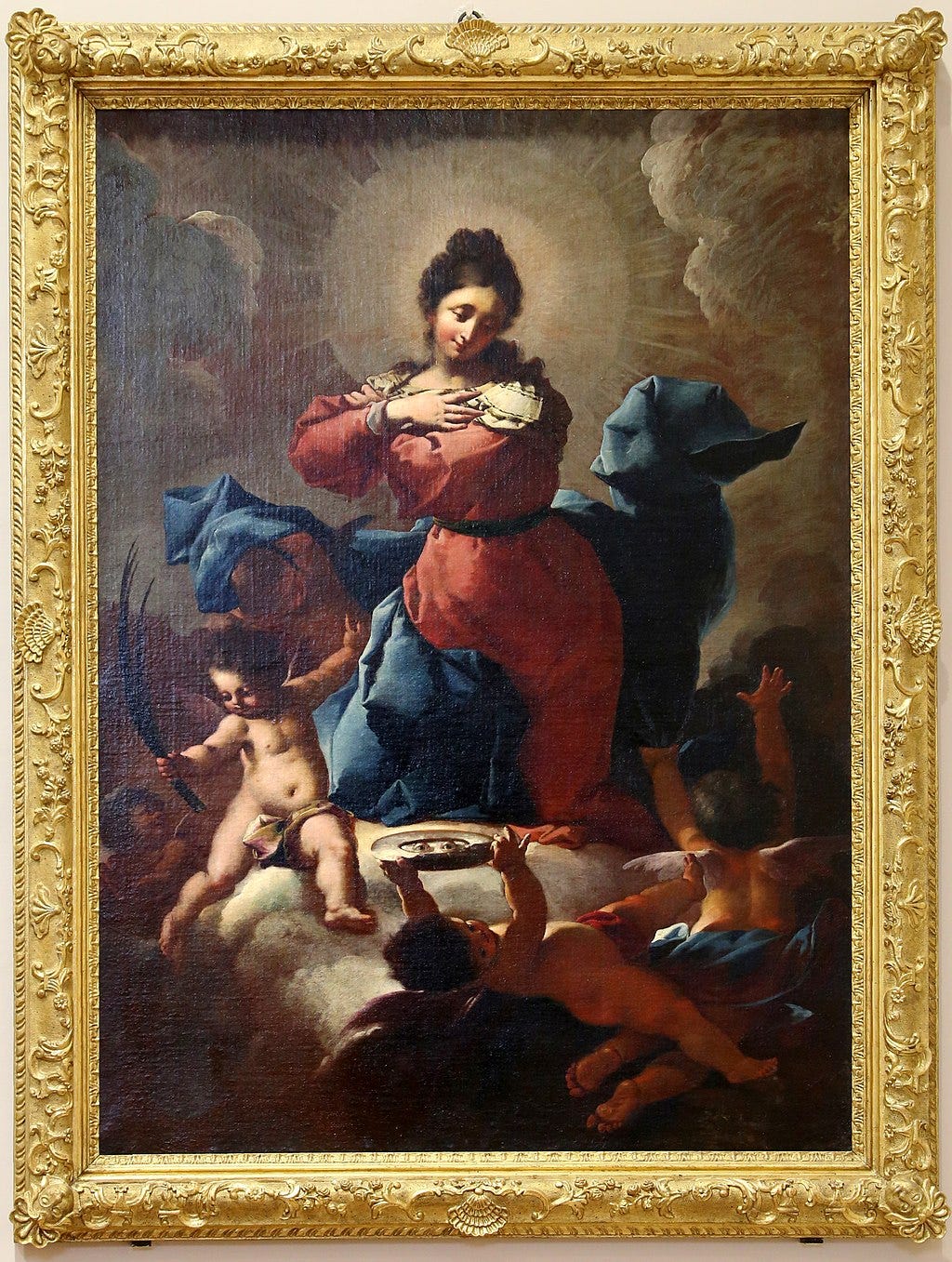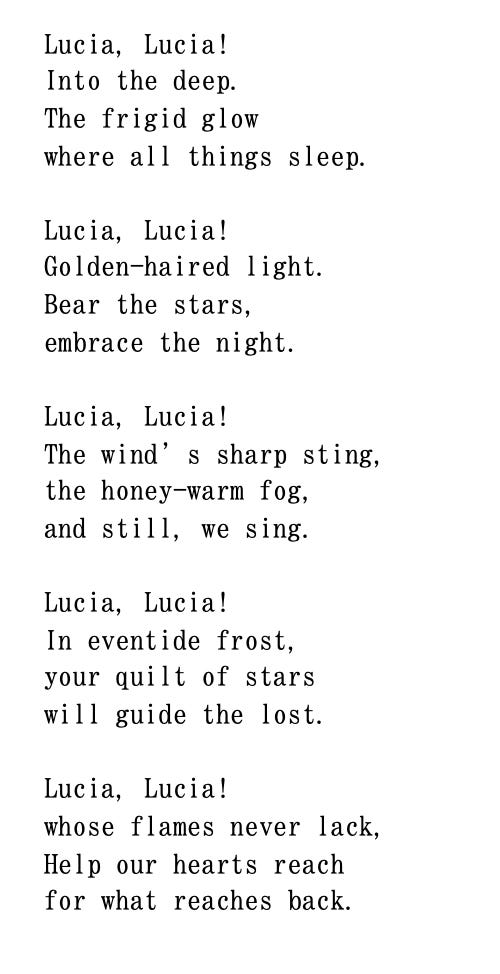This letter is free for you to read, but it wasn’t free for me to write. It would mean so much to me if you could take a minute to prayerfully discern becoming a full subscriber. Our full subscribers keep the lights on, but they also get access to our entire archives, summer read-alongs, Q & As, and whatever else my faithful feminist brain dreams up. If you want more essays on Catholic feminism, upgrade your subscription.
I love St. Lucia’s day.
I’ve written many times about my distaste for winter, so I’m constantly seeking opportunities to make it sparkle. We leave our twinkle lights on outside until mid-March. I’m constantly tiptoeing around the house lighting every candle we own. I tuck afghans over the backs of our sofas, crank our fireplace to the highest setting, and feed my family bubbling casseroles and oozing fudge cakes.
And while I can’t profess that I’m any expert in liturgical living, I have tried my best in the past couple of years to embrace celebrations in small ways, when I can1. Pierogi on John Paul 2’s feast day. Strawberry shortcake for Johnsmas. And one of my favorite opportunities for leaning into the church calendar is our family celebration on the morning of St. Lucia’s day.
Who was Saint Lucia?
Saint Lucia (or in English, Lucy…but Kirstin from the American Girl books calls her Lucia and SO WILL I) was a young martyr who lived between around 283–304 AD.
According to tradition, Lucia was born to wealthy, noble parents. Her father died young, leaving Lucia and her mother, who suffered from a bleeding disorder, behind. Saint Agatha—a fascinating martyr in her own right who had her breasts sawed off—had died about 50 years previously and Lucia’s mother liked to go to her shrine and pray. Lucia had a vision of St. Agatha telling her to consecrate herself to God and to distribute her dowry to the poor instead. She began to care for the poor and the persecuted Christians, specifically by bringing food to those who were hiding in the catacombs of Rome. To keep her hands free, and to light her path, she wore a crown of candles.
Unfortunately, Lucia’s mother had already kinda-sorta promised her to a prominent pagan dude. When the guy found out Lucia was no longer planning on marrying him, he ordered her into a brothel to be defiled.
…Yikes.
But she refused to go, and the guards couldn’t move her. An entire team of oxen couldn’t pull her, so they tortured her by gouging her eyes out. They then tried to light her on fire, but she wouldn’t catch, so they eventually stabbed her in the throat. (This is the part of the story where non-Catholics usually start backing away from me slowly.)
This is why I love being Catholic.
We are simultaneously high-church and low-church. We are burning incense; we’re getting dirt under our fingernails. We’re singing hymns and reciting chants; we’re marching in the streets and calling down oppressors. We’re wearing crowns of candles; we’re dying gruesome deaths at the hands of rejected pagan assholes.
We eschew jewels and comfortable lives of luxury for climbing around among prisoners in catacombs because we heard a voice while at a shrine for a dead lady. What a weird, wild religion.
So every December 13, oldest daughters across the world dress up in white gowns with red sashes to represent virgin martyrdom. There, they present fika (buns and coffee, although we’re usually doing sourdough cinnamon rolls) to their family, announcing that Saint Lucia has invited you to breakfast.
And in the delicious darkness of the early morning, when the stars are still pale and bright, we munch on sugary carbs and bring a little light to our own domestic church. We know the rest of our lives—the rest of the year—hell, the rest of the day—have a good chance of being filled with strife. We know there will be arguments and grief, because we live in a broken world. But we know all the stronger that light illuminates the darkest corners of our world. That goodness cannot be vanquished, not even by death.
Katherine May writes in her stunning book Wintering: The Power of Rest and Retreat in Difficult Times, “Winter is not the death of the life cycle. It’s its crucible. Once we stop wishing it were summer, winter can be a glorious season in which the world takes on a sparse beauty and even the pavements sparkle. It’s a time for reflection and recuperation, for slow replenishment, for putting your house in order. Doing these deeply unfashionable things — slowing down, letting your spare time expand, getting enough sleep, resting — is a radical act now, but it’s essential. This is a crossroads we all know, a moment when you need to shed a skin. If you do, you’ll expose all those painful nerve endings and feel so raw that you’ll need to take care of yourself for a while. If you don’t, then that skin will harden around you".
To light candles and sip coffee, to make beautiful and hygge our inner spaces while the outside world looms—this isn’t a frivolous hobby, or just something to snapshot for Instagram. It’s an intentional, visible sign of what we know to be true. That sorrow is only a passing thing, and that light does, in fact, win out over darkness.
A poem I wrote the other day while meditating on Lucia:
On My Nightstand
Prosecute the Men Who Pay for Sex, Not the Women Who Sell It: I appreciated this as a long-time fan of the Nordic model. “The addition of cash into the equation somehow blinds us to the power dynamics, and the men who exploit her lack of choices recede into the shadows. We have to pick a side. Either ‘transactional sex’ is exploitation, or it is not. What’s more, we need to shift our focus from the women selling sex to the men who pay for it.”
It Can Be Both Things: A really lovely piece on the beauty of learning to hold both joy and disappointment. I’ve been struck this year by how difficult I find that task—not seeing every day as Good or Bad, but quite honestly, both things.
Illusions of Control and the Ableism of Big Fertility: A read that reminds me of the Flannery O’Connor quote about facts not becoming untrue simply because they’re hard to stomach. “Children are not a means to the end of adult happiness or fulfilled longings. They are human beings who deserve to be treated with dignity. Refusal to accept that we are not ultimately in control means asserting our control over others.”
In case you missed these Letters:
Give the gift of the Catholic Feminist.
Did you know Substack supports gift subscriptions? If you have a hard-to-buy-for Catholic feminist in your life who’s passionate about Jesus + justice that you think would enjoy these letters, snag ‘em one! I mean, it’s better than yet another cute coffee mug, am I right? ;)
If you’re not following
, you should be. Her newsletter has been such a great resource.














I don't know, the story fills me with conflict as a feminist. It doesn't really seem like she triumphs here. I come away with the feeling of a threat: this is what happens when you say no to a powerful man.
So God kept her body from being "defiled" by prostitution, but not by torture? Why not just help her escape? It seems like God in this story acts like a mortal man protecting his property from other men than a loving God upholding female dignity. Maybe that's why people back away.
Help our hearts reach for what reaches back!! Beautiful reflections, gorgeous poetry...thank you for this. I'm adding your poem to the Lucia part of my binder so we can enjoy it each December.
I'm always so inspired by you & your work, so I'm just tickled by your kind wors...and so grateful to share in these paradoxical, whimsical-yet-wise traditions with you!